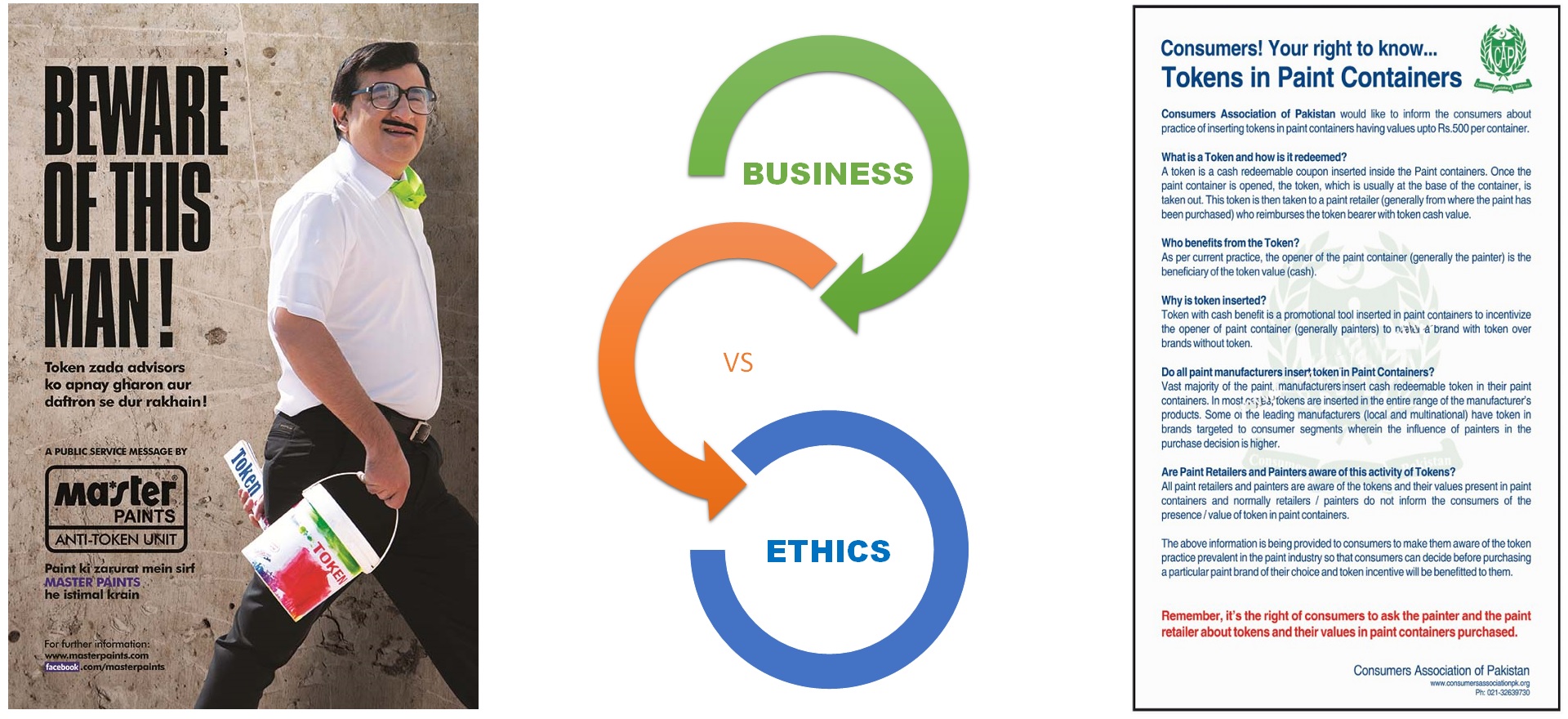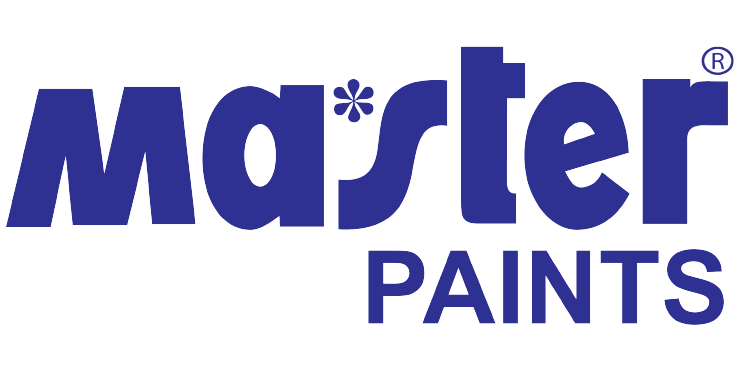
The Story and invention of “Token” is in fact against the spirit of fair competition where the manufacturer blinded by the greed to capture the whole market started to practice putting un-disclosed “Token” in their packs to boosts the sales and to hi-jack the paint market. But in their short- sightedness they could not foresee that this will give the rise to the mushroom manufacturers who will use this evil sales tool against them and the same thing happened that paint manufacturer without even proper registration or address jumped into the market, solely on the basis of ”Token” in their paint packs. And now the ground reality of paint market is that even the Multi-National paint companies who never use token in any other country of the world, and abide by all the Rules and Regulations of good business practices in other countries, are openly and fearlessly involved in “Token Scam” in Pakistan. Here, the question arises when these Multi-National companies are not using “Token” as sales promotional tools in other countries, why they failed in Pakistan to sell their product without “Token”, why they have double standards of business practices i.e unethical for Pakistan and ethical in the rest of the world? If putting undisclosed “Token” is their right in Pakistan then why the same sales tool is illegal/un-ethical in other countries of their operations.
Accordingly, The Competition Commission of Pakistan (CCP) issued show cause notices to sixteen paint companies for deceptive marketing practices by misleading end consumers about the price of the paint packs, which is prima facie violation of Section 10 of the Competition Act, 2010.
The Director General Legal/Registrar CCP Ikram-ul- Haq Qureshi issued show cause notices to the paint companies here on Thursday. The companies which have been issued the show cause notices are the following: M/s ICI Pakistan (Ltd), M/s Nippon Paint Pakistan (Pvt) (Ltd), M/s Kansai Paint (Pvt)(Ltd), M/s Berger Paints Pakistan (Ltd), M/s Brighto Paints (Pvt)(Ltd), M/s Diamond Paint Industries(Pvt)(Ltd), M/s Mansoor Paint Industries, M/s U.P Paint Industries (Pvt) Ltd, M/s Nelson Paint Industries, M/s Chawla Chemical and Metal Industries (Pvt) Ltd, M/s Brolac Paints (Pvt) (Ltd), Karss Paints Industries (Pvt)(Ltd), M/s Allied Paint Industries, M/s Sika Paint Industries (Pvt) (Ltd), M/s Rafiq Polymer Industries and M/s Black Horse Paints. These SCNs were issued.
The show cause notices were issued after it was brought to the notice of the CCP during advocacy sessions held with the Consumer Association of Pakistan, that paint manufacturers were hiding tokens or redeemable coupons in paint packs. Upon preliminary investigation of the matter, the CCP found that the practice of putting tokens is a monetary incentive not to the buyer but the painter, ranging from approximately Rs 20 – Rs 500 varying with the size of the paint pack and depending on the brand. Typically, the painter gets the token as it is concealed at the bottom of the paint pack. The painter then encashes the token from a shop or company outlet while the end consumer/buyer bears the price of the paint pack without any knowledge of the token. However many of the undertakings maintain that the token is intended for the benefit of the end consumer.
This non-disclosure of important information amounts to the distribution of misleading information as to the price of the paint packs. Based on these preliminary findings, in its show cause notices the CCP has stated that the paint companies were misleading end consumers related to the price of the paint in terms of clause (b) sub-section (2) of Section 10 of the Act. The aforementioned paint companies have been asked to submit their written arguments within fourteen days and to appear before the Commission on August 25, 2011.
It is the responsibility and obligation of the CCP under the Act to ensure free competition in all spheres of commercial and economic activity and to protect consumers from anti-competitive behaviour and deceptive marketing practices. Since some of the undertakings gave the assurance that they will start disclosing the presence of the token, owing to CCP’s compliance oriented and conciliatory approach a lenient view will be taken towards them.
According to the show cause notice, through the marketing practice of placing tokens in the Paint, the units makes its consumers believe that the price of the paint paid by the consumer to the shopkeeper is the true price, however, the actual position is different. This non-disclosure of important information constitutes withholding of the information regarding the price of the paint.
Therefore, the undertakings are called upon to show cause in writing, within 14 days of this show cause notice and to appear and place before the Commission, facts and material in support of their contention and avail the opportunity of being heard either in person or through an authorised representative on August 25, 2011 at the office of the Commission, show cause notice added.

This is the story of dodgy payments and shady business practices involving some of the largest, most powerful companies in Pakistan. At stake is the prize of becoming the dominant brand of paint in a country on the verge of a boom in construction activity. These companies will stop at nothing, pay whatever they have to, in order to win that prize.
The recipient of those dicey payments? A high-ranking government official? An elected politician? A wealthy businessman? A high court judge? Nope. The recipient is the daily wage labourer, barely earning more than minimum wage, whom you might hire to come and paint your house.
“Behind every great fortune lies a great crime.” These words, originally written by Honoré de Balzac, and quoted by Mario Puzo in The Godfather and Supreme Court Justice Asif Saeed Khosa in a dissenting opinion on the Panama Papers case, reflect a common perception that wealth generation requires financial malfeasance. It also creates the mistaken impression that only the wealthy are involved in questionable financial transactions.
This story will demonstrate, however, that corruption is not a matter of wealth and power, but incentives. Given a strong enough incentive to engage in unethical behaviour, a distressingly large number of people will do so, regardless of their level of wealth or power. And to be the recipient of an illicit payment, one need not be wealthy or powerful, but merely in a position to offer an undue advantage to an entity looking for it.
The case of the ‘token’
Consider the simple act of getting your house painted. Given most middle-class Pakistanis’ aversion to a do-it-yourself attitude, the vast majority of painting of residential and commercial properties is done by professional painters who are often daily wage labourers who earn barely above the minimum wage. You would not think that bribery (or at least something that has the strong appearance of bribery) would be involved in a matter so simple as that. And yet, you would be wrong.
Why would anyone need to bribe a daily wage labourer? The reason is simple. While the labourer is poor, and usually not very well educated, he (it is almost always a he) has something that the middle-class family getting their house painted does not have: expertise on which paint and how much of it, is required for a paint job. Most people rely on the painter to recommend which paint they should get in order to do the job, and that reliance on the expertise of the painter is what gives him the kind of market power that paint manufacturers are willing to pay big money for.
It all started in the mid-1990s, when a small boom in construction, combined with a large number of new entrants in the paint manufacturing market, led to a serious increase in the level of competition in the paint market in Pakistan. Companies were desperate for market share and willing to offer massive discounts in order to be able to get it.
According to market research conducted by Nippon Paint Pakistan, 60% of paint buying in Pakistan is conducted by the labourer doing the actual painting. Another study found that 70% of consumers and painters stated that the advice of the painter was critical to the decision of which paint was purchased for a paint job.
Under these circumstances, while offering a discount on the wholesale or retail price of the paint would help somewhat, the companies looking to entice more buyers of their paints had to find a way to make sure that it was the labourer who got the discount, even though he was not the one paying for it.
Enter the ‘token’.
The token was an innovative practice invented in the mid-1990s, and it was meant to solve the decision-maker/purchaser dichotomy. Before the anti-token campaign by Master paints, which was followed by litigation in Competition Commission of Pakistan, tokens were strictly speaking not illegal and soon every company realized the sheer genius of the scheme. Paint manufacturers started placing tags or stickers on each paint box with an amount of money written on it. That tag or sticker came to be known as the token, and could be redeemed at any paint retailer or wholesaler for cash.
In order to ensure that it is the painter and not the homeowner who gets the cash from the token, paint companies place the token inside the paint bucket at the bottom, in a concealed packet underneath the actual paint. This is designed to ensure that the person doing the painting would be the first person to be able to access the token.
With the introduction of the token, the labourer all of a sudden saw their incentives flipped. Prior to the advent of the token, the labourer would either buy the cheapest paint or the one with the highest quality, or else a good combination of price and quality, depending on the needs and ability to pay of the person getting their house painted. Now, however, the labourer did not care about price or quality, but instead about which paint company was offering the highest redemption value for the tokens on their paint boxes. In other words, the painter was being offered a bribe.
Where the law stands
In 2011, the Competition Commission of Pakistan, then chaired by activist chairman Khalid Mirza, decided to take action against the practice of placing tokens that were clearly designed to benefit the labourer at the expense of the end consumer. Over a period of seven months, beginning in June 2011, almost all of the major paint manufacturers in Pakistan submitted public documents explaining their marketing practices of using tokens for the very first time.
The hearings were a fascinating insight into the corporate culture of the companies involved in the paint industry.
The most forthright was Nippon Paints Pakistan, which admitted that it started the practice in 2009, two years after entering the Pakistani market and discovering that tokens were standard market practice. They admitted that the target of the token is the painter, and not the end consumer and that the purpose is to persuade the painter to buy their paint, or recommend to the homeowner to buy their paint.
Nearly all of the local manufacturers admitted up front that it was a marketing practice born out of intense competition in the market for paint and that they would rather not use tokens to promote their business and erode their profit margins in the process. Many also gave the Competition Commission a list of the brands and sizes of paint buckets and the value of the token on each of those buckets. The numbers varied by both company and size of the bucket, ranging from Rs 20 to Rs 400 per bucket.
The one company that admitted absolutely no wrongdoing and would not even admit that the tokens had anything to do with marketing was ICI Pakistan (the paint manufacturing business of which is now known as AkzoNobel Pakistan), which claimed that the tokens were a means of trying to combat counterfeiting of their paint brands. One can practically hear the commissioners scoffing at the mendacity of that claim in the written report about the hearings.
After three hearings over a period of seven months, the Commission issued an order on January 13, 2012, and found that the use of tokens without proper disclosure constituted deceptive marketing practices, and was a violation of Section 10 of the Competition Act of 2010. The commission ordered paint manufacturers to begin prominently disclosing both the existence and the redemption value of tokens on the paint buckets. The order read as:
“The disclosure with respect to the token on the paint pack as mentioned at (i) above should be made with the use of bright/conspicuous colors distinct from the color of the packaging of the paint pack and should be printed in clear, bold and legible size.”
However as per Profit’s market research, barring multinationals like AkzoNobel (formerly ICI), Nippon and a few local companies, CCP’s order is still not being implemented in its true spirit. See the image below in which only the Paintex brand by AkzoNobel (centre image) has prominently disclosed the coupon on the top front of its paint bucket in a bright orange colour.
Other players like Brighto Paints (left image) displays it at the back of its pack and that too at the bottom of it while Diamond paints (right image) just stamps it anywhere on the pack. Both are not exactly following CCP’s directions. And then there are also those who in complete violation of the law are not disclosing anything at all. (Courtesy: Profit Magazine - Pakistan Today)
Token as a Parallel Currency
As the token are being accepted and paid to the bearer of the instrument (token), still not regulated/approved to be acceptable/en-cashable like negotiable instrument, neither they have expiry like certain regulated negotiable instrument e.g Bank Cheques got expired after certain period but token has no expiry, it work as Perpetual Parallel Currency like Bearer Bonds, since after their existence token are in use, and there is no time limit to claim the amount of token. Accordingly the very existence of token stands in violation of the Section 35of “The State Bank of Pakistan Act 1956” , the said section states that – 35. Offenses and penalties relating to unauthorized issue of bills and bank notes. (1) No person in Pakistan other than the Bank or as expressly authorized by this Act, the Federal Government shall draw, accept, make or issue any bill of exchange, hundi, promissory note or engagement for the payment of money payable to the bearer on demand, or borrow, owe or take up any sum or sums of money on the bills, hundis or notes payable to bearer or demand of any such persons, but such cheques or drafts, including hundi, payable to bearer on demand or otherwise may be drawn on a person’s account with a banker, shroff or agent.
(2) Notwithstanding anything contained in the Negotiable Instruments Act, 1881, no person in Pakistan other than the Bank, or as expressly authorized by this Act, the Federal Government shall make or issue any promissory note expressed to be payable to the bearer of the instrument.
Hence any Instrument having the financial value and payable to the bearer or the holder and free transferable just by handing over should be approved and regulated under the law.












